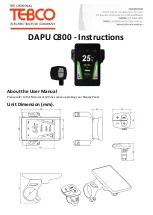
03
Installation
Find your vehicle's fuse box. Typically it locates under the driver
steering wheel or underneath your engine hood. Please refer your
vehicle manual.
Remove an original fuse associated with your vehicle’s ignition
ACC/Switched or Permanent power supply.
We recommend that the maximum rating of the fuse is no more
than 20 Amps. Please refer your vehicle manual.
There is a 2 Amp fuse (Item 5) built in the socket for 2 Amp fuse
tap cable (Item 6) which protects the dash cam. Please do not
remove or change it.
Choose the correct fuse tap cable from the three supplied types.
Plug in the original fuse to the socket for the original fuse (Item 7).
Plug in the Fuse Tap Cable to the socket where the original fuse
was removed from the fuse box on Step 1.2.
1.1
1.2
1.3
1.4
Step 1: Connect the Fuse Tap Cable to the fuse box.
Mount the dash cam behind the rearview mirror and connect
the 5V Mini USB connector (Item 1) to the dash cam.
Beginning with the dash cam end, tuck the car power cable into
the headliner and hide the power cable along the A-pillar to the
rubber trim by using a pry/trim removal tool to loosen any trim.
Make sure there is still enough cable for dash cam connections.
Keep lining the cable to the fuse box. Once you have the cable to
the fuse box, look for the ground around the area of the fuse box.
We recommend you ground the negative(-) spade connector
(Item 3) to a bolt on unpainted bare metal. Next, plug in the
po) car power bullet connector (Item 4) to the po)
fuse tap cable bullet connector (Item 8), and it will enable the
dash cam to receive power. Organize any excess cable by using
a cable clip to a convenient position.
2.1
2.2
2.3
Step 2: Car Power Cable Installation






































